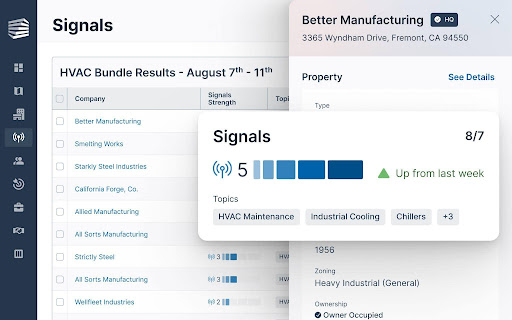Introduction
“Prospecting” can often feel like a treasure hunt. But, instead of a map clearly marked with an X, you’ve got vague clues that could lead to a lucrative deal—or a complete dead end.
That’s what prospecting can feel like for your sales team: Digging through mountains of data, making educated guesses, sending cold emails, and hoping to uncover “gold” – a qualified lead ready to buy.
Instead of educated guesses, imagine you have a GPS that leads you directly to the treasure, bypassing the dead ends and pitfalls along the way. That’s what sales intelligence tools are designed to do for your sales strategy. Like a GPS system, sales intelligence tools guide your team to hungry buyers who are actually searching for your products and services.
Automated sales intelligence tools utilize advanced technology, such as AI, to provide actionable insights, improve sales processes, and maximize revenue.
In this article, we’re going to talk about the 7 Best Sales Intelligence tools for local sales teams. We’ll cover What sales intelligence is, how it’s streamlining sales through data and analytics, and which platforms are tailored to your team’s needs.
Let’s get started!

What is Sales Intelligence?
There are more than 260 sales intelligence solutions on the market today, so when we use the term, “sales intelligence” everyone pictures something different. Some people think of databases of names like ZoomInfo or LinkedIn Sales Navigator, others imagine sales coaching tools like Gong, and others picture property intelligence platforms like CoStar or Convex.
No matter what you’re picturing, you’re probably right, as each sales intelligence solution offers unique features and benefits.
Sales Intelligence Definition and Importance
According to Salesforce, “sales intelligence” refers to the process of gathering and analyzing data from sales operations and activities to gain insights into customer needs and behaviors.
In other words, sales intelligence is a way for your team to gather information about potential buyers that will help them make more informed decisions during the sales process.
These tools can also help manage deal management throughout the sales cycle, shortening it by providing insights into revenue-affecting actions.
But, the features (and benefits) of these tools can vary a lot between platforms. Some tools excel in prospecting, lead generation, and sales automation, while others specialize in intent signals, sales analytics, route planning, sales process optimization, or even sales coaching and training – every sales intelligence platform is different.
The real question is: with over 260 solutions available, how do you select the right ones for your team?

Choosing the Right Sales Intelligence Tool
Selecting the ideal sales intelligence tool for your team involves considering key factors like scale, industry, and budget—each of which plays a pivotal role in aligning the tool with your team’s needs. But, some secondary factors should be considered before you settle on a solution:
As you evaluate these factors, narrow down your options to a select few that best meet your criteria, ensuring you choose the best sales intelligence software for your needs.
Primary Factors:

Scale: The size of your team dictates the scale of the tool you need. For smaller teams, utilizing a complex tool like LinkedIn Sales Navigator may not be the most efficient or practical. This can lead to unnecessary expense and underutilization.
Conversely, larger teams backed by marketing and business development departments with complex sales processes will benefit significantly from comprehensive systems designed to handle intricate operations and larger data volumes.

Industry: Your industry should be a primary factor in choosing the right tool for the job. For example, if your sales team sells into property management groups and facilities departments, having a tool that’s equipped with best-in-class contact data, permitting data, servicing information, or other property-specific information will help you better target and engage potential buyers.
Certain platforms are specifically designed for particular sectors— such as technology or real estate— and include features tailored to meet those industries’ unique demands and challenges.

Budget: For most companies, your financial resources will also be a critical consideration in the decision process. While the market offers a range of tools from budget-friendly options to premium platforms, there’s a balance between the cost and the value delivered.
When it comes to sales intelligence, ROI is the key! Aim to choose a tool that offers the best return on investment (time, dollars, and deals) without straining your team’s budget.
Once you’ve looked at the primary factors, here are some additional factors to consider specific to sales intelligence solutions:
Data Accuracy: High-quality data is critical for generating reliable insights. Ensure the tool you choose maintains rigorous data accuracy standards and regular updates to ensure your team isn’t digging up “fool’s gold.”
Integration Capabilities: The tool should seamlessly integrate with your preferred CRM and other tech stacks to enhance rather than disrupt your current systems. This isn’t a deal-breaker by any means, since many sales intelligence tools work well on their own- but, the more they integrate with your tech stack, the fewer manual and repetitive tasks you’ll have to deal with to keep everything in sync.
User Adoption: Ease of use is vital. Sales teams “hate” learning new tools – unless they know the tool will save time and increase their earnings. That’s why a tool that’s intuitive and user-friendly will encourage widespread adoption across your team without the headaches of convincing and cajoling. Sales reps need tools that are intuitive and user-friendly to optimize sales processes and improve close rates.
Comprehensive Features: Opt for a platform that offers extensive data on verified contacts and decision-maker details, advanced search capabilities, and the ability to track industry trends and generate leads effectively.
Generative AI: Generative AI is a newcomer to sales intelligence software. It uses artificial intelligence and machine learning to generate potential leads data, make recommendations on outreach emails and sales call topics, and automate sales functions like follow-ups. This feature can save hours each day in research and prospecting and help identify new opportunities that you may have overlooked previously.
Scalability: Select a sales intelligence platform that can evolve with your team’s growth. As your business and data needs expand, the tool should manage more users and complex tasks seamlessly. This ensures the platform supports your business as it scales.
As you evaluate these factors, narrow down your options to a select few that best meet your criteria. This careful consideration will ensure that the sales intelligence tool you choose not only fits but enhances your sales strategy, helping you achieve more precise and effective outcomes.

Where Does Sales Intelligence Data Come From?
When it comes to sales intelligence, information is power and data is king!
The quality and sources of data utilized by sales intelligence platforms are as important as the features included in the software – if not more so. The data quality influences everything downstream from intent data and buying signals to outreach messaging and strategic sales decisions made by your team. Here’s an overview of common data sources:
Customer Relationship Management (CRM) Systems: CRMs are a primary source, storing historical data on customer interactions, sales transactions, and engagement histories that help sales teams understand client behavior over time.
Marketing Automation Platforms: These tools provide insights into prospective and current customer engagement with marketing materials, giving sales teams data on customer interests and engagement levels. Marketing teams rely on these platforms to provide insights into customer engagement, helping to tailor sales strategies effectively.
Social Media and Online Interactions: Social platforms are rich with consumer data, offering real-time insights into trends, preferences, and sentiments that can inform personalized sales strategies.
Customer Feedback and Surveys: Direct feedback from customers provides qualitative data that can signal satisfaction levels, purchasing intentions, and potential areas for product or service improvement.
Third-Party Data Providers: These sources supply additional data points not typically captured through organic interactions, such as industry trends, market forecasts, or competitor analysis.
Public data: Public data like permits and licenses, property records, or government data provide useful insights into business information and potential opportunities.
At Convex, we add an additional layer to provide our customers with best-in-class data. Through a proprietary blend of machine learning and extensive data partnerships, Convex maps data sources at the individual property level, ensuring detailed and comprehensive market analysis.
In short, our platform is designed to update most of its data daily, which is crucial for maintaining accuracy and relevance in rapidly changing markets.
Now, let’s talk about a few of the different platforms available.

Top Sales Intelligence Tools for B2B (Commercial Services) Sales Teams
Commercial services sales are very different from SaaS, automotive, and other forms of sales in that you’re generally selling into a location. Whether a hospital, manufacturing facility, multifamily apartments, or mixed-use real estate, your prospects tend to be static and fixed. Sometimes you may know they’re expanding or moving, but- in general, their geographic location is constant.
These tools are designed to improve targeting, engagement, and efficiency for both sales and marketing teams, ensuring alignment and boosting revenue through actionable insights.
This means you need a tool that can effectively pinpoint insights that lead to actionable opportunities. Here’s how some of the leading sales intelligence tools cater specifically to these needs:

Sales Intelligence Solutions:
Convex: Tailored for sectors such as HVAC, solar, security, and commercial cleaning, Convex leverages detailed property intelligence and market data to provide actionable insights, making it an indispensable tool for businesses focused on property-related services.
Bombora: Specializes in intent data that reveals which companies are actively exploring products or services like yours. This allows your sales team to engage with prospects at the moment they are most receptive, enhancing the timeliness and relevance of your pitches.

Lead Generation Tools
Convex: Specifically designed for commercial and industrial sales teams, Convex also wins on the “lead generation front.” With comprehensive property intelligence use buying signals and intent data to identify high-value prospects in real estate-driven markets. Our platform excels in converting complex data into clear, actionable leads, making it ideal for businesses targeting facility managers and property owners.
Datanyze: Renowned for its technographic data, Datanyze offers crucial insights into the technologies that potential clients currently use, enabling sales teams to craft highly customized pitches that address specific technological needs or gaps.
Clearbit: This tool integrates seamlessly with CRM systems to provide real-time updates on prospect information, ensuring your sales database is always accurate and up-to-date. It’s particularly effective for teams that prioritize ongoing engagement and precision in their sales processes.

Sales Automation Platforms
HubSpot Sales Hub: Combines robust CRM capabilities with advanced sales automation features, streamlining every step from initial contact to deal closure. Its comprehensive suite of tools supports a wide array of sales activities, making it ideal for teams that manage extensive sales pipelines.
Drift: Utilizes AI-driven chatbots to interact with prospects directly on your website, qualifying leads automatically and reducing the initial load on your sales staff. This can be particularly effective for companies looking to optimize their engagement strategy and improve lead conversion rates.

Account-Based Marketing Tools
6sense: This platform excels in using AI to predict buyer behavior and optimize the timing of outreach, ensuring that your communications hit the mark when prospects are most likely to be receptive. It’s particularly useful for teams employing a targeted, account-based marketing approach.
Please note that there are also great database options like CoStar, LinkedIn Sales Navigator, and Cognism, but these are generally a better fit for very specific use cases. CoStar for real estate professionals, “Sales Nav” for ABM, and Cognism for GDPR, compliance, and other legally defensible markets like banking.

Conclusion: Unleashing Sales Potential with Intelligent Tools
B2B sales solutions are rapidly evolving. In a world where data can provide clarity, the right intelligence tools are a necessity. Sales intelligence software dramatically enhances productivity and performance by transforming raw data into actionable insights. These tools enable sales teams to deeply understand customer behavior, preferences, and needs, providing a significant edge over the competition.
Accurate B2B contact data—spanning names, job titles, industries, and direct contact details—empowers sales professionals to bypass gatekeepers and engage directly with decision-makers. This direct connection is crucial for closing deals swiftly and boosting overall sales performance.
More than just data access, effective sales intelligence allows your team to anticipate market trends, tailor engagements with precision, and respond proactively to customer needs. It’s about making informed decisions that drive revenue growth and build lasting business relationships.
Are you ready to transform your sales process with cutting-edge insights?
Experience how advanced sales intelligence can revolutionize your sales approach in local and national markets. Schedule your demo of Convex today and discover how the right insights lead to outstanding results.
Share





